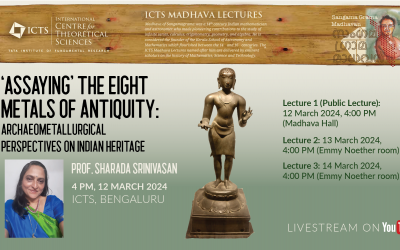Lecture 1 (Public Lecture): 12 March 2024, 4:00 PM (Madhava Hall)
Lecture 2: 13 March 2024, 4:00 PM (Emmy Noether Room)
Lecture 3: 14 March 2024, 4:00 PM (Emmy Noether Room)
Abstract:
Archaeometallurgy pertains to the technological study of metallic archaeological artefacts and art objects to gain insights into the manufacturing techniques and history of technology. It can also help in the better classification of archaeological artefacts through studies on provenance and sources of metal. Archaeometallurgy is increasingly becoming a widely inclusive discipline of archaeology that attempts to trace the history of ancient metal production, distribution and usage in antiquity and the related socio-cultural and economic ramifications. The early metals to be exploited were those that were found in the native state, followed by those that could be smelted or reduced easily from ores, while those that were more difficult to smelt were discovered later. The commonly used metals in antiquity included gold, silver, copper, iron, tin, lead, zinc, and mercury. In the first lecture, Prof Sharada Srinivasan will explore the broader trajectory of the use of metals, and in Indian and particularly south Indian antiquity. The second two lectures point to some highlights of pre-industrial Indian contributions interspersed with insights from surviving craft traditions. These lectures draw on her archaeometallurgical studies on non-ferrous metallurgy in the skilled early use of high-tin bronzes and the making of statuary bronzes to the unique methods of extraction of metallic zinc, and in ferrous metallurgy in the use of wrought iron and high-carbon Steels and to later innovations such as the use of metal-cased rockets. Thus the lectures would point to the significance with respect to a broader global understanding of the history of science and technology.
About the Speaker:
Prof. Sharada Srinivasan is a Professor at the National Institute of Advanced Studies (NIAS), Bengaluru working in the areas of archaeological sciences, archaeometallurgy, and technical art history. She was elected International Honorary Member of the American Academy of Arts and Sciences in 2021 in Archaeology. For her work, Sharada received the Padma Shri, the fourth-highest civilian award in India in 2019. Her awards include the INAE (Indian National Academy of Engineering) Woman Engineer in Academia 2021 Award, the Distinguished IITB Alumnus Award, and the Dr. Kalpana Chawla Young Women Scientist Award for 2011 from the Government of Karnataka. She earned her Ph.D. from the Institute of Archaeology, University College London (1996) on Archaeometallurgy of South Indian bronzes; her MA from the School of Oriental and African Studies, London (1989) and her BTech in Engineering Physics from IIT Bombay (1987). She is a Standing Committee member of the International Conference on the Beginning of the Use of Metals and Alloys (BUMA) and a Fellow of the Royal Asiatic Society of Great Britain and Ireland. She has also been a co-recipient of UKIERI grants with the University of Exeter for research in archaeological sciences. Sharada has also been an acclaimed performing artiste of the classical South Indian dance style of Bharata Natyam.



